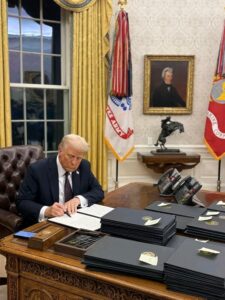In a significant and controversial move, former President Donald Trump formally announced that the United States would be pulling out of the World Health Organization (WHO). The decision, which stirred debates across political and global health circles, marked a pivotal moment in the country’s relationship with the international health body. Citing concerns about the organization’s handling of global health crises and perceived bias, Trump argued that the U.S. contributions to the WHO were not yielding sufficient accountability or benefits.
The announcement came amid heightened scrutiny of the WHO’s role in managing global pandemics, with critics questioning its transparency and effectiveness. Trump accused the organization of favoring certain nations and failing to act decisively during critical health emergencies. He also highlighted the U.S.’s substantial financial support to the WHO, suggesting that these resources could be better utilized elsewhere to directly serve American interests.
This decision, however, drew sharp criticism from public health experts, international allies, and domestic opponents. Many argued that withdrawing from the WHO would weaken the global response to health crises and isolate the U.S. from vital international collaborations. Health advocates warned that the move could have long-term implications for global disease control, vaccine development, and emergency preparedness.
Supporters of the withdrawal praised the decision as a stand against inefficiency in global institutions, asserting that the U.S. should prioritize reforms in organizations that fail to deliver. They argued that such actions would pressure the WHO to implement necessary changes and improve its governance. Meanwhile, opponents feared that abandoning the organization could erode the U.S.’s influence in global health policymaking and diplomacy.
Trump’s decision to sever ties with the WHO underscored a broader trend of skepticism toward multilateral organizations during his administration. While the announcement drew widespread attention, it also sparked ongoing debates about the future of global health collaboration and America’s role in tackling worldwide chall enges.
enges.